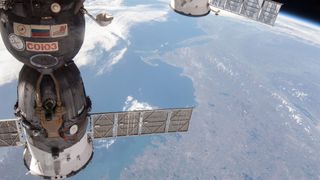Russia will opt out of the International Space Station (ISS) program after 2024, the new chief of Russia's federal space agency Roscosmos said Tuesday (July 26).
Roscosmos leadership has been threatening to pull out of the International Space Station for months, stating that Western sanctions will "destroy" Russian cooperation aboard the orbital lab. While those threats have been numerous and inflammatory, they have yet to sound as definitive as the latest proclamation made by the new Roscosmos chief. "The decision to leave the station after 2024 has been made," the current head of Roscosmos, Yuri Borisov, said(opens in new tab), according to the Associated Press.
"That is very recent news, and so we haven't heard anything officially," said Kjell Lindgren, a NASA astronaut currently aboard the ISS while speaking at the 11th annual International Space Station Research and Development Conference (ISSRDC(opens in new tab)) on Tuesday (July 26). Lindgren currently serves as commander of the NASA SpaceX Crew-4 mission. "Of course, you know, we were trained to do a mission up here and that mission is one that requires the whole crew and so we continue to work every day to conduct the science and research that we've been trained to conduct," he continued. "As a crew we continue to work towards success and that is everybody working together to make sure we're accomplishing the science and keeping the crew and the vehicle safe."
NASA Administrator Bill Nelson issued a statement on Tuesday (July 26) stating that the agency is "committed to the safe operation of the International Space Station through 2030, and is coordinating with our partners." Nelson added that "NASA has not been made aware of decisions from any of the partners, though we are continuing to build future capabilities to assure our major presence in low-Earth orbit."
In an emailed statement, Scott Pace, who served as deputy assistant to the President and Executive Secretary of the National Space Council from 2017-2020, wrote that Russia's announcement is "not a surprise" and that "reiterating their current commitment through 2024 is helpful for planning."
Pace added that "what comes after 2024 is still very unknown, however, and the real question is when do in-depth technical discussions begin for *how* the transition will be managed (rather then whether there will be a transition). Among the considerations will be maintaining the Station's altitude in the future, replacing ground communications support from Moscow, and disposition of Russian assets currently attached to the Station. Beyond the Station, it remains to be seen whether the Russians will be able to launch and maintain their own, smaller, station."
Retired NASA astronaut Scott Kelly, who flew to the International Space Station on three of his four spaceflights and spent close to a year aboard the orbiting lab on his final mission, wrote on Twitter on Tuesday (July 26) that he believes the Russians "will try to stay as long as they can afford it" because the ISS program "gives Putin needed credibility domestically and internationally." In his opinion, Russia's announcement is "more vague, open-ended bluster."
Kelly has previously traded barbs on social media with former Roscosmos chief Dmitry Rogozin after Rogozin tweeted out a video of Russian technicians placing tape over the flags of the United States, Japan and other nations on a Soyuz rocket that was supposed to launch satellites from Kazakhstan for a United Kingdom-based internet provider within weeks of Russia's invasion of Ukraine. That launch was cancelled soon after due to new restrictions imposed by Roscosmos.
The space station's design means that the U.S. and Russian segments of the station are interdependent, and it's not clear to what extent the U.S. could maintain its facilities should Russia leave the partnership. The ISS partner agencies are currently only committed to operating the lab until 2024, and NASA plans to begin shifting toward commercial space stations at some point following the end of the ISS program.
There are discussions to extend the life of the aging laboratory past 2024, although none are yet concrete. NASA has argued that the ISS could be safely operated until 2028, while the agency's administrator, Bill Nelson, has said the station's tenure could be pushed to 2030; U.S. President Joe Biden has directed the agency to aim for 2030. Currently, the station costs between $3 billion and $4 billion each year to operate.
NASA has not issued a statement in response to Borisov's comments, nor have any of the other international partners in the ISS program, which includes the European Space Agency, Canada and Japan. Borisov's remarks come less than two weeks after Roscosmos and NASA reached a long-awaited agreement to exchange seats on spacecraft traveling to and from the orbiting laboratory; NASA astronauts will fly on Russian Soyuz craft, while Russian cosmonauts will ride on the SpaceX Dragon capsule beginning this fall.
Borisov recently replaced the outspoken Rozgozin, who was dismissed on July 15 following months of inflammatory and controversial public statements about Russia's continued involvement with the ISS program following Russia's ongoing invasion of Ukraine.
Given the ambiguity of his 2024 statement, it could be that the new Roscosmos chief is following in his predecessor's footsteps and using the ISS for propaganda purposes; while his comments can be interpreted as Russia is setting a hard line against Western sanctions, Russia, along with the other international ISS partners, will certainly opt out of the space station in 2024 if the program ends as currently scheduled.






